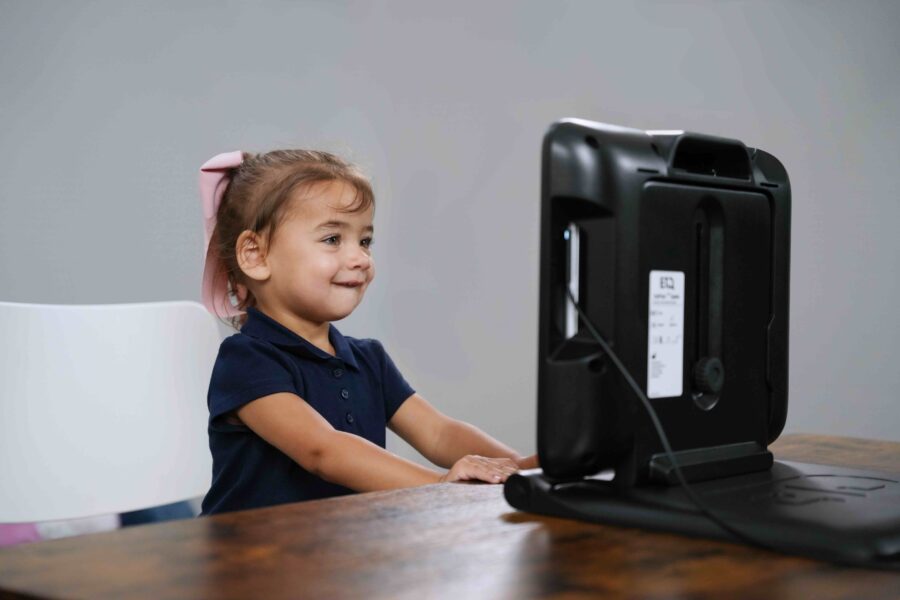The UNMC Munroe-Meyer Institute is piloting a new diagnostic tool that could dramatically cut waitlists for an autism diagnosis.
Alice Shillingsburg, PhD, director of the integrated Center for Autism Spectrum Disorders at MMI, has been a site investigator for the new technology – EarliPoint™ Evaluation for Autism – since last year. MMI is one of a handful of sites involved in research that is testing its efficacy among older children. It is the first in Nebraska using the device clinically.
The device first received FDA approval for use with children ages 16 to 30 months in 2023, and MMI now is using it as part of some autism diagnosis procedures.
Dr. Shillingsburg and her co-investigator at MMI, Patricia Zemantic, PhD, program director of the Autism Diagnostic Clinic, describe the device as a game-changer.
“For many children, we will be able to use this device to confirm the presence of autism, when combined with clinical judgment and developmental history,” Dr. Zemantic said. “In cases where we might be uncertain, we can prioritize additional testing and assessments. But if we only do these more complicated, complex evaluations on a smaller number of patients, we’re going to be able to see more patients more quickly.”
Dr. Shillingsburg estimates that hundreds of families in Nebraska are on waiting lists for autism diagnoses.
The device is a tablet that shows short videos. Research has shown that children 16 to 30 months old on the autism spectrum concentrate more on different areas of the video – objects instead of faces, for example – than their neurotypically developing peers. The device tracks eye movement 120 times per second and has shown a high degree of accuracy in identifying children on the autism spectrum.
“The research piece is still ongoing, specifically studies to validate the use of the device in older kids,” Dr. Zemantic said. “But since the clinical device has already been FDA approved for children between the ages of 16 and 30 months, we’ve begun clinical use with the device.
“This is a total game changer in terms of being able to help people access diagnoses quickly and efficiently. And hopefully, we find out this device is effective for older children as well.”
MMI is one of a handful of sites taking part in the ongoing research, which explores the device’s efficacy with children ages 31 to 84 months.
The device, which the company said has an accuracy rating of about 80%, will not be considered the final word on a diagnosis, Dr. Zemantic said. It will be used in conjunction with other accepted diagnostic tools.
“The video evaluation takes 20 or so minutes,” she said. “We do additional observation, including tests such as the Childhood Autism Rating Scale, to ensure diagnostic accuracy. But we estimate appointments using the device will be about an hour and 15 minutes long overall. Currently, they take about four hours.”
The huge time savings will help bring down waitlists not only in Nebraska but across the country, Dr. Shillingsburg said.
The portability of the tablet-sized device also will help MMI and other providers reach underserved areas. Clinics with trained therapists could be held across the state.
“Diagnoses open the door to intervention,” Dr. Shillingsburg said. “We know that early intervention is key to best-case trajectory and development. Nationwide, the average age of diagnosis is 4 or 5 years old, and ‘early’ intervention isn’t applicable at that age. You can see what this means for hundreds of thousands of families in terms of getting an early diagnosis and then accessing care.”
MMI currently has two devices for clinical use. Clinicians will be using the device in a toddler clinic starting in April 2024 and plan to increase toddler appointment slots early in summer 2024. Interested families should start by getting on the Autism Diagnostic Center’s waitlist for an autism evaluation by contacting the MMI patient information office.
John Reviere, vice president of clinical affairs, EarliTec Diagnostics, Inc., said the company was “thrilled” to partner with MMI on clinical implementation of EarliPoint™️ to accelerate early and efficient diagnosis of autism in young toddlers.
“MMI’s innovative philosophy lends itself to using technology to provide an objective assessment that increases the clinician’s confidence in making a consequential diagnosis,” Reviere said. “Beyond clinical use, MMI is also a research partner, as one of only 15 centers across the United States participating in the MEASURE-ASD research program. The center’s extensive experience in diagnosing and treating children with autism, combined with its world-class facilities, makes MMI and ideal site for this important research.”
